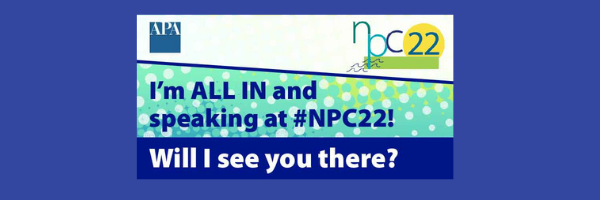4 Ways to Connect With Us at #NPC22
Members of the KLA Team Speaking, Accepting Awards April 30-May 3
The American Planning Association (APA) National Planning Conference (NPC) was long a staple on KLA's presentation circuit. From Phoenix in 2016, through New York, New Orleans and San Francisco, we had booths in the exhibit hall, spoke at countless sessions, attended amazing events and receptions, loaded up on best practices, and connected with previous and future clients among hundreds of others. Alas the NPC we had most been anticipating was 2021 on our home turf in Boston -- especially when we found out we won the 2021 Leadership in Sustainability Award -- was held virtually.
But now we're pumped to head back in person to #NPC22 in San Diego. If you or a colleague will be there, here are 4 ways we would love to catch up:
1. Join our workshop, "Overcoming Barriers to Aggressive Climate Action," on Saturday, April 30 from 3:30-5pm. (1.5CM) Participants in this workshop will focus on overcoming barriers to high-impact strategies that all communities must implement to meet 2050 climate goals. Small group breakouts will delve into three or four strategies, such as requiring all new construction to meet net zero-standards, transitioning to electric vehicles, and rethinking a circular waste stream. See more details below, but we promise it will be an in-depth, collaborative session*.
2. Attend our Speed Share Session on Monday, May 2 from 4:30-5:15. (.75CM) Kim will join other speakers for a series of 5-minute talks. Our "Why Planners Need Editorial Calendars" will address the key steps to building an editorial calendar that leverages seasons, holidays, and local events to improve social media, email, and event engagement. Attendees will receive a sample calendar focused on climate and sustainability.
3. Meet us at the Sustainable Communities Division reception and awards on Monday, May 2 6-8pm. Last year KLA took home the Leadership in Sustainability award, and Kim will be on hand to accept the award (presented virtually last year) and cheer on the 2022 winners. This is always a fun event, and this year will combine the Sustainable Communities Division, City Planning and Management Division, New Urbanism Division, and National Capital Area Chapter. Plus food and drinks!
4. Set up a time to chat. Want to grab coffee or find a time to meet between sessions to talk about your climate and sustainability goals? We would love to meet up, hear what's happening in your community and share what we've got going with our climate action planning and Community Dashboard (including a short demo if you'd like). Just drop us a line and we'll make it work.
We look forward to diving back in at #NPC22 and hopefully connecting or reconnecting with you!
*Overcoming Barriers to Aggressive Climate Action workshop
Division Endorsement: Small Town and Rural Planning Division
Focus on overcoming barriers to high-impact strategies that all communities must implement to meet 2050 climate goals. Small group breakouts delve into three or four strategies, such as requiring all new construction to meet net zero-standards, transitioning to electric vehicles, and rethinking a circular waste stream.
Start by reviewing strategies and case studies, emphasizing lessons learned and keys to success. Choose to participate in a facilitated breakout group focused on one high-impact strategy. Discuss the challenges to implementing the selected strategy in your community and use existing resources, best-practice case studies, and participant experiences, to collectively develop a pathway to overcome implementation barriers. Apply equity tools and frameworks to ensure all pathways to implementing high-impact strategies are designed to achieve equitable solutions.
The NPC Peer Reviewers assigned this presentation a learning level of Advanced.
Learning Outcomes:
Identify real or perceived barriers to implementing high-impact strategies (e.g. net-zero buildings, EVs, Circular Economy) for your community to address climate change.
Work collectively to design a pathway to overcome those barriers.
Utilize the resources provided to promote and implement the pathway in your community.




